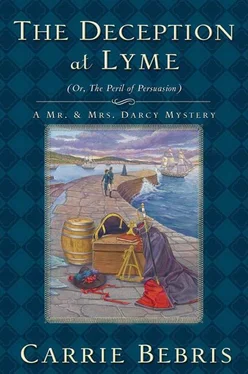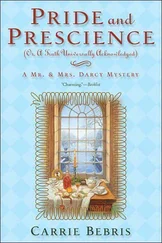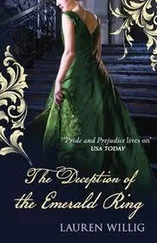Darcy started. It certainly had, but in ways the professor could not possibly know. “Why do you say so?”
“Unfortunately, countless relics from the Spanish Empire were lost to greed. The conquistadors wanted gold, not art, and melted ancient treasures without care for their cultural or scientific significance. So much history was destroyed—reduced to merely its metallic value—that surviving items are all the more precious. Collectors pay considerable sums for ante-Columbian artifacts, not all of them legally obtained.”
The door knocker sounded. Elizabeth rose and took the pendant from the archaeologist, who relinquished it with the reluctance of a suitor. “Thank you, professor. We appreciate your knowledge—and your discretion.”
* * *
Dinner proved a success. As Elizabeth had hoped, Sir Laurence and his sister perfectly complemented their party. Professor Randolph found the baronet a worthy conversationalist on subjects both artistic and scientific, and the pair were in mutual rapture over the paleontological promise shown by a young local girl whom the archaeologist had met at the Philpot sisters’ home the previous evening.
“Only imagine, Miss Ashford—” A gentleman scholar, Professor Randolph always did his best to draw others into his discourse, no matter how obscure the topic. “Miss Anning was but thirteen when she and her brother discovered a full ichthyosaur skeleton—the first complete one ever found!”
Elizabeth had not the faintest notion what an ichthyosaur was, but Professor Randolph spoke of it with such enthusiasm that she was impressed nonetheless.
Miss Ashford smiled knowingly. “Miss Anning also oversaw the excavation.”
Professor Randolph was delightfully surprised by her familiarity with the story. “Do you, too, study fossils?”
“No more seriously than do most visitors to Lyme. My brother, however, maintains such eclectic pursuits that I cannot help but develop a dilettante’s knowledge in some of them. His interest in classical antiquities inspired me to read Homer.”
“In Greek?”
She laughed. “No, Chapman’s translation. As I confessed, I am a dilettante.”
Elizabeth turned to Sir Laurence. “Miss Darcy tells me that your interest in Greek antiquities extends to the Parthenon sculptures that Lord Elgin has brought to Britain.”
“Lord Elgin is a visionary man who does not deserve the controversy his noble operation and personal sacrifice have generated,” the baronet said. “When he saw the damage the building and its frieze had already suffered under the occupation of the Turks, and the continued deterioration to which it was subjected, he took action—at his own expense—to rescue the marbles and preserve them for posterity. And now,” he said with disgust, “his detractors accuse him of not having followed proper Turkish legal procedure, or of trying to profit by selling the sculptures.”
“Is he not currently in negotiations with the British government regarding a price?” asked Darcy.
“It was always his intention to present the marbles to the nation as a gift for the ages,” Sir Laurence said, “but dire financial straits have compelled him to request reimbursement for his expenses—paying his crew and transporting the marbles to England.”
“He asks nothing for the value of the sculptures themselves,” Professor Randolph added. “A mercy, as I do not know how anybody could fix a price on such treasures.”
“All objects have a price.” Sir Laurence swirled the wine in his glass. “Even if he did want compensation for his trouble, I would still consider him to have acted unselfishly in saving those artifacts from destruction. Would the world benefit any less from their preservation if he received a reward for having effected it? If he chose at this point to keep them for himself, I would not fault him.”
“Do you think an ancient culture’s treasures can rightfully belong to an individual?” Georgiana asked.
“Yes, I do.” He smiled at her, though his expression soon grew serious once again. “Particularly if that individual values them more than do conquerors into whose hands they have fallen. The Turks did not merely neglect the Parthenon, they used it as a powder magazine, caring not a whit when its roof was blown off during the Venetian siege. I would support Elgin’s rights to the sculptures even if he had not acted under the full knowledge and permission of the Ottoman authorities in removing them. Better such treasures survive in the private ownership of a man who appreciates them than be destroyed by an empire that does not.” He turned to Randolph. “As a professor of antiquities, surely you agree?”
“Having seen the sculptures, I cannot imagine where a private individual—even an earl such as Lord Elgin—would display them for his own enjoyment. They require an enormous amount of space. As it is, the museum plans to build a new gallery for them, if Parliament ever finishes its negotiations and enquiries.”
“What of smaller artifacts?” Sir Laurence asked. “Are they not better off intact as the personal property of a connoisseur than seized and squandered by unenlightened vandals?”
“Certainly. Not every relic in the world need belong to a museum. Many artifacts were created as personal possessions. Why should they not remain so?” Randolph paused, then added, “If obtained legally, of course. I cannot countenance theft, either direct or through the circumvention of authority.”
“Nor could I, of course,” Sir Laurence said. “But given circumstances similar to Lord Elgin’s, I would have done the same. Would not you, Miss Darcy?”
Georgiana appeared surprised to have her opinion solicited. “I cannot imagine ever finding myself in such a position. But if I were, I should like to think I would act to preserve artifacts from either destruction or theft.”
The conversation wandered from there to other subjects, as any conversation with Professor Randolph is wont to do. When the evening ended, Sir Laurence and his sister invited Georgiana, Darcy, and Elizabeth to dine with them later in the week.
Yes, Elizabeth thought as she prepared to retire, from Georgiana’s standpoint, the evening was a resounding success.
“Having long had as much money as he could spend, nothing to wish for on the side of avarice or indulgence, he has been gradually learning to pin his happiness upon the consequence he is heir to.… He cannot bear the idea of not being Sir William.”
—
Mrs. Smith, speaking of Mr. William Elliot, Persuasion
“I do not understand why Anne was asked to stand as Alfred’s godmother, and I was not,” Elizabeth overheard one of the Elliots say as she, Darcy, and Georgiana joined the queue of guests waiting to be acknowledged by Sir Walter and his family at Alfred’s christening celebration. The religious rite complete, the witnesses—and, judging from the number of guests arriving, a good many others who had not been at the church—now converged upon the Assembly Rooms for a fete so extravagant that all other venues in Lyme (to say nothing of the bounds of good taste) were insufficient to accommodate it.
Sir Walter had enlisted all five godparents to join him and Miss Elliot in greeting the company, that his guests might be sufficiently impressed; he also insisted that little Walter Alfred Henry Arthur Elliot be present for all to admire. The slighted would-be godmother, whom, based on her resemblance to Sir Walter, Elizabeth took to be the baronet’s youngest daughter, stood at the end of the receiving line with a gentleman Elizabeth assumed was her husband.
“I have been married much longer and have two children, while my sister has been married but months,” the affronted speaker continued. For all her professed domestic experience, she appeared fairly young, perhaps a year or two older than Elizabeth. “What does Anne bring to the godmother’s office, of a mother’s feelings and sense of duty, that I could not?”
Читать дальше












